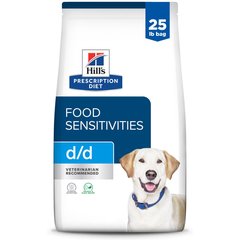Limited Ingredient Dog Food: Is This Diet Right for Your Pup?

Photo by mark_ka/Adobe Stock
If your dog has allergies or tummy troubles, limited ingredient dog food (LIDF) might help.
The best limited ingredient dog food formulas focus on a few select ingredients to streamline your pet’s diet to eliminate anything that’s irritating your dog.
Key Takeaways
- Limited ingredient dog food is designed for dogs with allergies or stomach sensitivities.
- It usually has one source of protein and one source of carbohydrates.
- This type of formula can help identify and avoid trigger ingredients that cause skin issues (like rashes or itching) or digestive problems (like vomiting or diarrhea).
- Always choose an AAFCO-approved formula and consult your veterinarian before switching foods.
What Is Limited Ingredient Dog Food?
While there’s no official definition for limited ingredient dog food, these formulas typically feature a shorter ingredient list than regular foods.
“[They often] contain one type of protein and one type of carbohydrate, both being ingredients that are less commonly found in most other diets,” says Brian Collins, DVM, an extension associate at the Cornell Richard P. Riney Canine Health Center in Ithaca, New York.
Dr. Collins points out that LIDFs frequently use a protein source that is less common than beef or chicken, such as lamb, fish, or venison.
Why Do Dogs Need Limited Ingredient Dog Food?
There are two main reasons your vet might recommend a limited ingredient dog food.
Allergies
If your dog shows signs of a food allergy, your vet might recommend a limited ingredient dog food.
Some signs that your dog may have allergy-related skin issues include:
- Rashes
- Persistent itching
- Bald spots
- Red, inflamed skin
Stomach Sensitivities
Gastrointestinal upset is also a common reason to consider this diet, says Carol Osborne, DVM, at Chagrin Falls Pet Clinic & Veterinary Center in Chagrin Falls, Ohio.
Signs of stomach sensitivities include:
- Vomiting
- Diarrhea
- Excessive gas
- Loss of appetite
- Abdominal pain
The goal of switching to a limited ingredient dog food diet is to find out what ingredients your pet can tolerate without tummy upset or an allergic reaction, says Dr. Collins.
With that in mind, take note of any changes to your pet’s bathroom habits or overall well-being and keep close tabs on what else your pet might eat outside of mealtimes.
What Are the Risks of an LIDF Diet?
As long as you choose an AAFCO-approved formula, there are no risks with giving your dog a limited ingredient dog food, Dr. Collins says.
That said, an LIDF might not be best for every pet, and your dog could actually be sensitive to the ingredients in a specific formula. Always consult your veterinarian before changing your dog’s food.
What Are the Best Limited Ingredient Dog Foods?
Start by asking your vet for recommendations.
If you’re comparing formulas on your own, Dr. Osborne suggests checking the ingredients list closely and paying attention to the order.
- High-quality protein should be listed first, such as chicken, beef, or salmon. “What you don’t want is a meat byproduct or meat meal,” she says.
- Single-source carbohydrates like oatmeal, rice, or quinoa are ideal. Avoid fillers like soy and corn.
- Natural preservatives, like ascorbic acid (vitamin C) or tocopherol (vitamin E), are preferable to artificial preservatives.
Some vet-recommended options include:
Recommended Products
FAQs About Limited Ingredient Dog Food
Can I feed all my dogs a limited ingredient dog food?
Check with your vet, but usually it’s OK, as long as other pets don’t have a medical condition that would require a different diet.
Is a limited ingredient dog food the same as grain-free dog food?
Limited ingredient dog food and grain-free dog food are usually two different things.
In some cases, though, a limited ingredient dog food might use a grain-free alternative as the single carbohydrate source—making the formula both limited ingredient and grain-free.
Is limited ingredient dog food better for all dogs?
A limited ingredient dog food can be beneficial for dogs with allergies or digestive problems, but it’s not always better for every dog. Ask your vet before switching food.
Can you buy a limited ingredient dog food over the counter?
It depends. Your vet might tell you to purchase an over-the-counter option, or they may give you a prescription for a veterinary formula.







